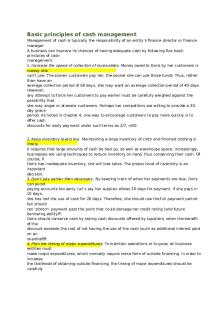EW - Module 3 Notes - A study of the basic principles of academic writing, including a series of assignments PDF

| Title | EW - Module 3 Notes - A study of the basic principles of academic writing, including a series of assignments |
|---|---|
| Author | Caitlin Stewart |
| Course | Fundamentals of Academic Essay Writing |
| Institution | Queen's University |
| Pages | 2 |
| File Size | 66.3 KB |
| File Type | |
| Total Downloads | 94 |
| Total Views | 124 |
Summary
A study of the basic principles of academic writing, including a series of assignments that emphasize logical organization, stylistic clarity, and grammatical precision....
Description
Module 3 Notes – Revising, Editing, and Proofreading: Revising for Structure & Consistency: -
Writing is an act of communication, with a purpose, a context, and an audience Editing your works allows you to produce the best communication tool possible o A piece of writing that is free of sentence faults & grammatical errors o Uses diction precisely o Conveys though simply and clearly o Has the best chance of being understood and appreciated
Revision steps: - Is your thesis clear and is it well-supported throughout the essay? - Does your thesis statement match your body paragraphs in terms of context and order? - Do the paragraphs follow in a logical order? - Does each paragraph have a single, clear point? - Are your introduction and conclusion engaging?
Creating Reader-Friendly Writing: Editing requirements: - Are your sentences clear? o Do they convey your thoughts correctly? - Do you need to cut words from your writing? - Do the sentences in your paragraphs flow logically? o Are they connected by transitional words when necessary? - Is your point-of-view consistent? - Have you adopted a tone that is right for your purpose and audience? o Is your diction well chosen- not too simple or too complex? Transition words: - In addition to - Furthermore - Moreover - Besides - Than, too, also, both - First, second, third, lastly, finally, etc. - For example, for instance
-
As a result, consequently Next, likewise, in the second place, as well as, also
Making Meaning – Sentence building & Punctuation: -
Main clauses should express more important ideas Subordinate clauses/phrases contain less important information and supporting ideas Emphasize information by putting them at the beginning of your sentences Use short sentences occasionally for impact Make sure all sentences are complete o Try not to use fragment sentences Use proper punctuation Writing is free of sentence faults o Ex. comma splices, run-on sentences, etc.
Polishing – Proofreading for Correctness in Grammar & Mechanics: -
Check for spelling mistakes, improper capitalization, missing or misplaces commas, misused colons or semicolons, and problems with pronouns...
Similar Free PDFs

Basic Principles of Microbiology
- 6 Pages

Basic Principles of ultrasound
- 38 Pages

Principles of News Writing
- 4 Pages

Basic Principles OF Fascism
- 5 Pages

Basic Principles of Heredity
- 23 Pages

Principles of Good Writing
- 2 Pages

BASIC PRINCIPLES OF TAXATION
- 46 Pages

2-Basic Principles of Heredity
- 23 Pages

Basic Principles of Power Electronics
- 312 Pages
Popular Institutions
- Tinajero National High School - Annex
- Politeknik Caltex Riau
- Yokohama City University
- SGT University
- University of Al-Qadisiyah
- Divine Word College of Vigan
- Techniek College Rotterdam
- Universidade de Santiago
- Universiti Teknologi MARA Cawangan Johor Kampus Pasir Gudang
- Poltekkes Kemenkes Yogyakarta
- Baguio City National High School
- Colegio san marcos
- preparatoria uno
- Centro de Bachillerato Tecnológico Industrial y de Servicios No. 107
- Dalian Maritime University
- Quang Trung Secondary School
- Colegio Tecnológico en Informática
- Corporación Regional de Educación Superior
- Grupo CEDVA
- Dar Al Uloom University
- Centro de Estudios Preuniversitarios de la Universidad Nacional de Ingeniería
- 上智大学
- Aakash International School, Nuna Majara
- San Felipe Neri Catholic School
- Kang Chiao International School - New Taipei City
- Misamis Occidental National High School
- Institución Educativa Escuela Normal Juan Ladrilleros
- Kolehiyo ng Pantukan
- Batanes State College
- Instituto Continental
- Sekolah Menengah Kejuruan Kesehatan Kaltara (Tarakan)
- Colegio de La Inmaculada Concepcion - Cebu






